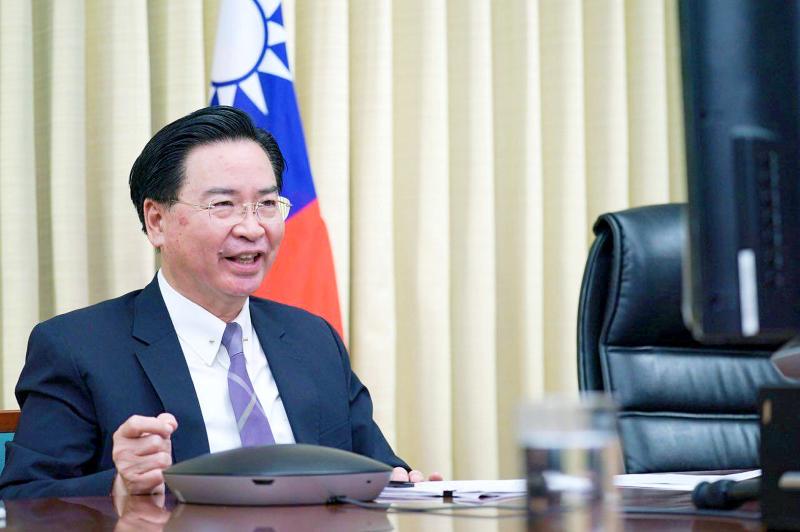Taiwan could play a significant part in a global restructuring of production lines and the supply chain of critical materials in the post-COVID-19 era, Minister of Foreign Affairs Joseph Wu (吳釗燮) said on Tuesday during a virtual discussion held by Washington-based think tank the German Marshall Fund of the United States (GMF).
A restructuring of the supply chain is being discussed all around the world, Wu said.
Critical materials supplied by Taiwan seem to be helping the international community, he added.

Photo courtesy of the Ministry of Foreign Affairs
Playing a significant part in a restructuring of the supply chain of critical materials would be a “very good role for Taiwan,” Wu said.
“I think there are already very good friends either from the United States or from Europe ... saying that they are looking at Taiwan as a natural partner in this type of restructuring,” he said. “We’ll be very happy to participate in this regard.”
The hour-long discussion, titled “The Post-Pandemic Order: Navigating Approaches to China,” was part of the GMF’s Brussels Forum and moderated by GMF senior visiting fellow Noah Barkin.
US senators Marsha Blackburn and Chris Coons, and European Parliament member Reinhard Butikofer were among the speakers who participated in the discussion.
Wu also spoke about the pressure Taiwan has faced from China.
“If you look at the situation in this part of the world, Taiwan is not the only country that is suffering from Chinese pressure,” Wu said, giving as examples a border conflict between China and India, a territorial dispute between Japan and China in the East China Sea, and the expected passage of national security legislation in Hong Kong.
“For Taiwan, we have been dealing with the pressure coming from China for years and years ... but in the period of the pandemic, we are feeling more heat from China — from a more assertive China — than ever,” he said.
While Taiwan has been dealing with military and diplomatic pressure from China for years, Wu said that it has gotten worse in the past few months.
“I think that we are seeing two competing paradigms in dealing with COVID-19,” he said. “On the one hand is democracy and transparency; on the other is authoritarianism.”
Wu said that he believes this competition extends beyond the handling of the pandemic.
“There are also two philosophies, two ways of life,” he said. “I think Taiwan is very clear: We are standing on the side of democracy.”
Taiwan feels Chinese pressure “more than any other country,” he said.
“If we stand strong, I’m sure all other democracies will feel that they have a hope in dealing with China as well,” he added.

INVESTIGATION: The case is the latest instance of a DPP figure being implicated in an espionage network accused of allegedly leaking information to Chinese intelligence Democratic Progressive Party (DPP) member Ho Jen-chieh (何仁傑) was detained and held incommunicado yesterday on suspicion of spying for China during his tenure as assistant to then-minister of foreign affairs Joseph Wu (吳釗燮). The Taipei District Prosecutors’ Office said Ho was implicated during its investigation into alleged spying activities by former Presidential Office consultant Wu Shang-yu (吳尚雨). Prosecutors said there is reason to believe Ho breached the National Security Act (國家安全法) by leaking classified Ministry of Foreign Affairs information to Chinese intelligence. Following interrogation, prosecutors petitioned the Taipei District Court to detain Ho, citing concerns over potential collusion or tampering of evidence. The

NEGOTIATIONS: The US response to the countermeasures and plans Taiwan presented has been positive, including boosting procurement and investment, the president said Taiwan is included in the first group for trade negotiations with the US, President William Lai (賴清德) said yesterday, as he seeks to shield Taiwanese exporters from a 32 percent tariff. In Washington, US Trade Representative Jamieson Greer said in an interview on Fox News on Thursday that he would speak to his Taiwanese and Israeli counterparts yesterday about tariffs after holding a long discussion with the Vietnamese earlier. US President Donald Trump on Wednesday postponed punishing levies on multiple trade partners, including Taiwan, for three months after trillions of US dollars were wiped off global markets. He has maintained a 10 percent

TRADE: The premier pledged safeguards on ‘Made in Taiwan’ labeling, anti-dumping measures and stricter export controls to strengthen its position in trade talks Products labeled “made in Taiwan” must be genuinely made in Taiwan, Premier Cho Jung-tai (卓榮泰) said yesterday, vowing to enforce strict safeguards against “origin laundering” and initiate anti-dumping investigations to prevent China dumping its products in Taiwan. Cho made the remarks in a discussion session with representatives from industries in Kaohsiung. In response to the US government’s recent announcement of “reciprocal” tariffs on its trading partners, President William Lai (賴清德) and Cho last week began a series of consultations with industry leaders nationwide to gather feedback and address concerns. Taiwanese and US officials held a videoconference on Friday evening to discuss the

PERSONAL DATA: The implicated KMT members allegedly compiled their petitions by copying names from party lists without the consent of the people concerned Judicial authorities searched six locations yesterday and questioned six people, including one elderly Chinese Nationalist Party (KMT) member and five KMT Youth League associates, about alleged signature forgery and fraud relating to their recall efforts against two Democratic Progressive Party (DPP) legislators. After launching a probe into alleged signature forgery and related fraud in the KMT’s recall effort, prosecutors received a number of complaints, including about one petition that had 1,748 signatures of voters whose family members said they had already passed away, and also voters who said they did not approve the use of their name, Taipei Deputy Chief Prosecutor